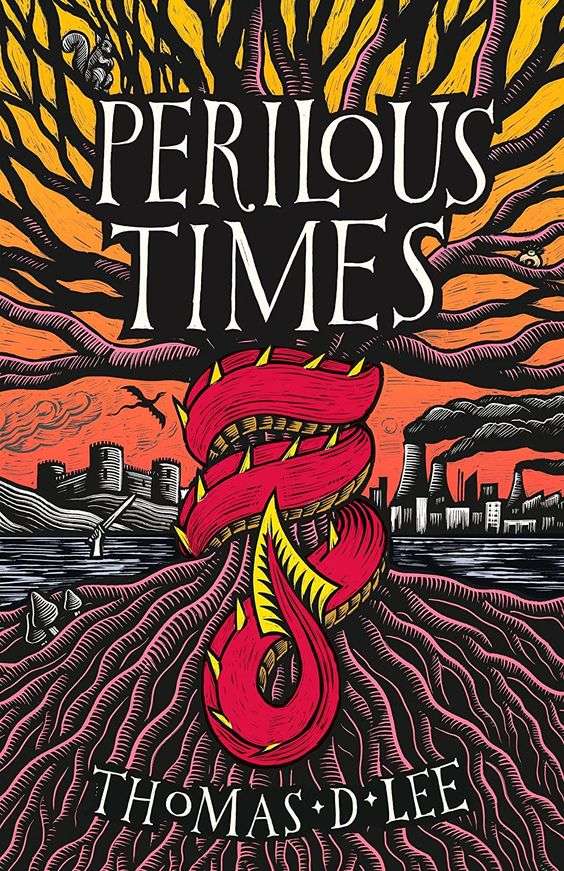We’ve implemented some new protocols around sending us messages via this website. Please email website “at” britishfantasysociety “dot” org for any issues.

For all things fantasy, horror, and speculative fiction
-
Announcement:

Perlious Times
Perilous Time by Thomas D. Lee from @orbitbooks #BookReview #Fantasy #Mythology Available for Pre-Order
Perilous Times by Thomas D. Lee

Orbit Books, pb, £8.99
Reviewed by Rym Kechacha
It didn’t even take me to the end of the first chapter to know I was in trouble. Context: I’m the mum of a six month old baby and a toddler, my reading time is limited and precious. So is my sleeping time. Realistically, if I want more of one I get less of the other.
And so there I am, reading the first chapter of Perilous Times with the baby asleep on my lap and thinking, oh dear. This is inconvenient. This is going to be a cracking book, and I’m not going to get enough sleep until I’ve finished it.
We all know how the stories end: after all that magical ccarry-onwith swords and battles and very well-hidden cups, King Arthur and his knights are only sleeping and will rise again when Britain is in danger. And we know how the stories are going: it’s pretty hard to look around modern Britain and think, ‘Yes, this is a successful and confident society in which the vast majority of citizens feel they can live comfortably.’ Perilous Times takes those two concepts, drenches them in humour and makes a rollicking great story from them with a clear and heartfelt plea to sort ourselves out.
Things in this fictional, near-future British Isles are pretty perilous, it has to be said. The Scots, Welsh and Cornish have declared independence, most of East Anglia is underwater, Manchester’s run by a rag-tag coalition of arguing leftists and something horrible being built in Somerset that calls itself Avalon. Unseasonably hot weather, air pollution, food scarcity and continuing burning of fossil fuels mean that things aren’t getting better any time soon, and although the overall tone of the novel is indisputably comic, there is a real howl at the core of this novel, a cry not only for the Earth – especially these denuded, fenced off islands – but also the political situations we are finding ourselves deeper and deeper mired in.
Mariam is a member of FETA (not the cheese, an eco-feminist collective) and increasingly frustrated at the scale of need and the seeming inability of anyone to do anything about it. Kay is more or less the figure we know him as: steward, Arthur’s foster brother and awake for the nth time in the past fifteen hundred years to once more save the day – only the multiple kinds of peril Britain finds itself in might be too much even for ancient prophecies.
The dialogue is smart and very funny, from the accurate skewering of idealistic activists to the world-weary voice of Lancelot, the aesthete, who is also not vastly pleased at being awake again.
The novel is completely folklore fluent and rooted in the land in a way that nimbly bypasses any kind of blood and soil nonsense and goes straight for heart and soul: Lee’s characters are diverse in all and every way, and his forest spirits and river goddesses are suitably ambiguous and tricksy, emanating from the land but the land as it is, right now, not idealised theories about what the land might have been, once upon a time. That’s one of the main things that gives the novel a delicious old-yet-new quality. The author is researching a PhD in queer interpretations of Arthuriana, yet this knowledge is worn lightly, plenty of room left for whatever formative Arthurian experiences the reader might bring to the text.
Comparisons with Pratchett are apt not just because of the humour but also the humane wisdom and compassion for all the characters; the sense of everyone just doing their best in a messy old world prevails.
If I was feeling pernickety (which I was not because the whole thing was a delight from start to finish), I might have wanted to see a villain with a bit more 3d complexity, which is partly something I’m thinking about in fiction the moment and partly how I feel climate change in fiction can show us messy motivations of people trying to do right and ending up doing wrong. However, despite the good v evil narrative arc, this is not a comfortable read. No one knows exactly what to do. The old world is gone, and the new one is struggling to be born. No one is coming to save us – and even if they are, we might not like it.
Explore the blog:
Blog categories:
Latest Posts:
Tags:
#featured (56) #science fiction (25) Book Review (264) events (44) Fantasy (231) Graphic Novel (13) horror (136) Members (62) Orbit Books (48) profile (43) Romance (17) Science Fiction (50) short stories (28) Titan Books (52) TV Review (15)
All reviews
Latest Reviews:
- THE HOUSE ON THE BORDERLAND by William Hope Hodgson
- Monstrum by Lottie Mills
- Mood Swings by Dave Jeffery
- Yoke of Stars by R.B. Lemberg
- Hera by Jennifer Saint
- The Black Bird Oracle by Deborah Harkness
- RETURN OF THE DWARVES By Markus Heitz
- Delicious in Dungeon
- Toxxic by Jane Hennigan
- THIS ISLAND EARTH: 8 FEATURES FROM THE DRIVE-IN By Dale Bailey
Review tags:
#featured (2) Action (4) Adventure (4) Book Review (28) Fantasy (18) Featured (2) Feminist (2) Gothic Horror (3) Horror (14) Magic (3) Orbit Books (3) Romance (6) Science Fiction (5) Swords and Sorcery (2) Titan Books (7)